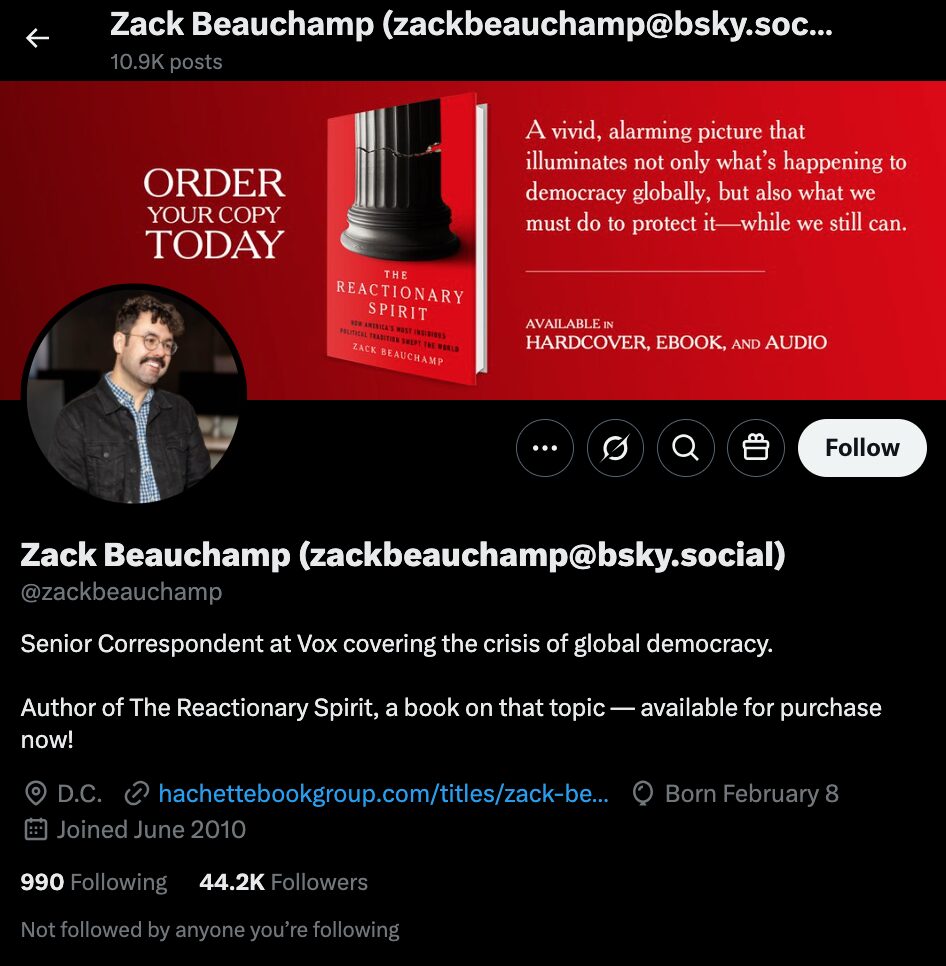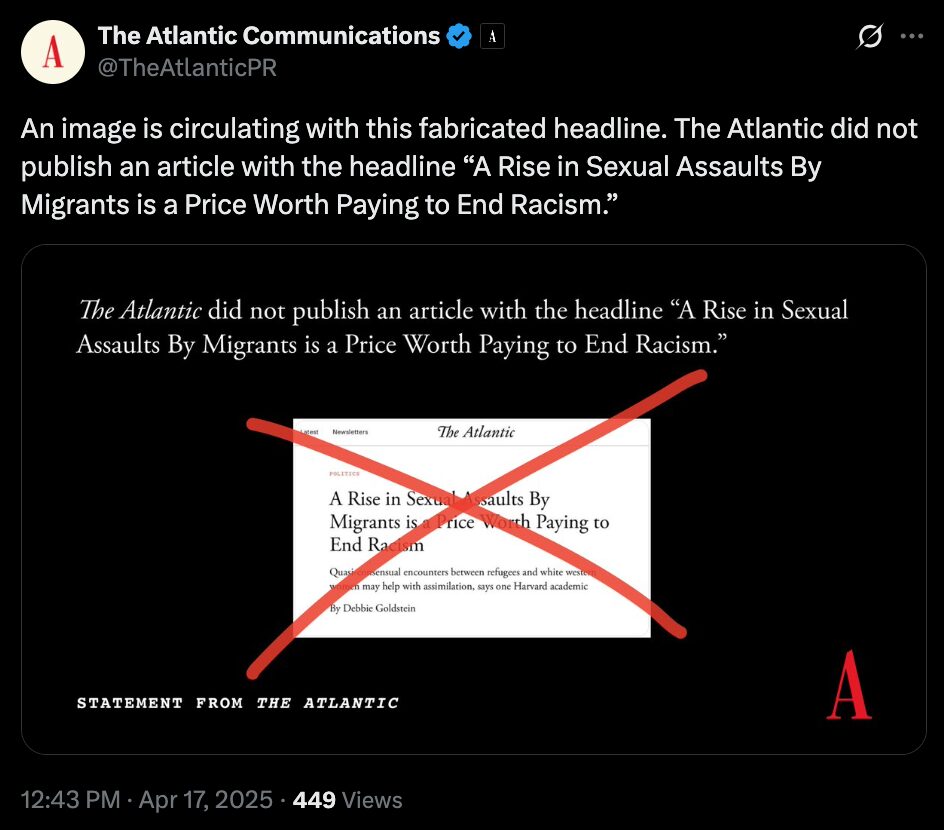The Atlantic fake fake news accusations (which usually come bellowing out of what you might call right-wing echo-chambers) came out again today. This time for a different, but all-too common reason. Few people would recognize that this is actually an odd kind of pattern that I felt deserved some overview. This year most of us remember The Atlantic from “SignalGate,” the now infamous group chat which detailed attacks on enemy forces.
The Atlantic’s editor in chief, Jeffrey Goldberg, claims National Security Advisor Mike Waltz inadvertently added him to a Signal app group chat. Goldberg claims they have a prior relationship. Waltz claims they don’t. It was a very bizarre situation to say the least, and ultimately people have moved on from that situation due to brand new scandals involving Trump’s “immigration” policy.
But The Atlantic isn’t only famous for “the Russia hoax,” as some claim. They routinely come out to deny publishing controversial headlines circulating online. Ironically, multiple reports always corroborate their denials, confirming these headlines as fake. It does lead me to wonder, though. Are they doing this themselves for some reason?
In other words, does The Atlantic (under the direction of Jeffrey Goldberg) release fake news stories just to deny them later, for sensationalist moments that drive traffic to their website? Is this something a contractor of theirs does? I find it hard to believe that ~7 time in the last (2) years this (1) publication is just accidentally at the center of those kinds of moments.
Seriously, The Atlantic Fake News Pattern Occurs Frequently
The Atlantic has spent an astonishing amount of the last two years furiously denying responsibility for fake headlines.
Allow me to quickly recap their greatest hits of denial and confusion:
- June 2022: Fact Check-The Atlantic did not publish headline calling President Biden’s bike fall ‘heroic’’
- May 2023: Fake Atlantic headline on white supremacy spreads online
- June 2023: Fact Check: Atlantic headline about man flashing a child at NYC Pride is fake
- March 2024: Fact Check: Atlantic headline on Ketanji Brown Jackson and ‘white supremacy’ is fake
- September 2024: Fact Check: Fake Atlantic headline on migrants stems from a satirical account
- October 2024: Images Circulating of Fabricated Atlantic Headlines
And just today, they’re trending again because – surprise! Another fake headline is making the rounds.


One of the top sharers of this story was a likeminded (to The Atlantic) journalist: Zack Beauchamp, Senior Correspondent at Vox covering “the crisis of global democracy.”
Either he was wittingly, or unwittingly, included in promoting this fake fake news headline.

Let’s be honest: this post has 15 views, and that happened only after Twitter started advertising the story as a trending topic. At the end of the day, the damage that’s really done is to the public. Because, that slot of news coverage does not belong to companies falsifying fake headlines. It belongs to real breaking information that Americans need to know now more than ever.
Breaking Down These Tactics & What To Do About Them
The simplest explanation would blame The Atlantic directly, because it’s difficult to believe anyone else is orchestrating a concerted effort against them. A company owned by Steve Jobs’ widow, with ample resources and technological capabilities, should easily be able to shut down such shenanigans.
I will of course, demonstrate my balanced and disciplined conclusion, by showing off the best possible case for an outside influence being responsible for this kind of lampooning.
Momentary Benefits of the Doubt
Let’s assume, generously, that The Atlantic isn’t secretly orchestrating a covert, viral-marketing-style false-flag campaign to keep their name relevant. If they’re innocent (and they would insist they are), we’re left with one burning question: Who in their right-wing mind wakes up, sips their domestically grown (lol) coffee, opens up Canva, and thinks, “Today is a good day to fabricate a plausible Atlantic headline!”
- An obsessive satirist?
This would mean someone has built an art form of crafting just-believable-enough fake news snippets to pin on The Atlantic, which the magazine 100% sees benefit from. They get lots of traffic to their website from genuinely curious people including those who otherwise would never consume their content at all. But an obsessive satirist who isn’t paid to do this? Unlikely. - A disgruntled former employee, or lover?
If somebody hated The Atlantic, Jeffrey Goldberg, the ownership, or even just another employee enough, maybe a person could be possessed to attack their credibility on a regular basis. Again, seems harder to believe than the idea of people within The Atlantic senior leadership planning covert communication campaigns for their own sake and/or on behalf of private clients of some sort. - A bored rogue staffer?
Imagine the fun: Every few weeks, someone deep within The Atlantic’s office leaks yet another absurd fake story, only to watch their frantic colleagues hastily tweet out disclaimers. In this (again) generous take, nobody else at the publication knows about the rogue staffer’s actions—even if some people there suspect someone on the inside is behind it.
If You Are Really Reaching…
Sure, there is at least (1) other possibility:
- Regular people routinely getting fooled by random acts of misinformation
Maybe there’s no conspiracy – and it’s just thousands of bored social media users who lack the time, energy, or interest to fact-check before retweeting. The problem there wouldn’t be malice; it’s that we’ve reached a point where The Atlantic headlines are so interchangeable with parody that it’s nearly impossible to spot the difference.
It requires some deep assumptions to believe any of these fictional possibilities. That is why it’s more likely than not, that The Atlantic does this from time to time for one or more reasons. I find it incredibly hard to believe they are victims of some kind of satirical spoof monster that so routinely harasses their paper in particular this way. So why else does this happen? It’s hard to say, but SignalGate began shining a light on it.
SignalGate Was A Poorly Orchestrated Scandal Like Nobody’s Ever Seen Before
SignalGate was another notable moment where The Atlantic found itself at the center of controversy – vehemently denying that they had done anything wrong, yet somehow benefiting from viral attention and increased visibility. Sound familiar? Either someone at the magazine stepped on a monkey’s paw or they’re the luckiest unlucky media outlet in America. Forget about their partisan slant (if one exists) – for a moment.
The fact remains, that everybody by now has made up their mind about SignalGate instead of remaining curious. We still don’t really know what happened. There are multiple conflicting reports which is very similar to the fake fake headline scandals The Atlantic has become notorious for. So, even though this won’t be a bombshell to anybody, the best analysis of today’s event is that The Atlantic probably did it themselves. That should lose them respect for being part of an industry that absolutely is not aligned with the interests of fair journalism.
They may do a fine job otherwise, too.
I’m not indicting the whole paper as some kind of shill of the government. But I am saying that readers, and generally members of the public should think about how the news that ultimately reaches them is constructed. Manufactured. And to think about possibilities beyond what will receive coverage from other outlets (who may well engage in similar behavior at a certain level) which makes it harder and harder for the general public to trust “the media.”
Why Do These Tricks Work On So Many People?
The Atlantic fake fake news tactic works on so many people because for the most part the public does not work on theories of what’s happening in the world. They trust experts, journalists, broadcasters, and the voices they have around them or that they follow online; to tell them what’s happening. Some people will trust those voices to exactly give them talking points to trot around at the office, their family functions, or social circles.
Others may doubt the content they consume about the news, but for the most people people are not attempting to crack the code on why they were given those stories to talk about. There are easy narratives like believing your side and disbelieving the other side. Doing that is safe for people. So the producers of news know that, and so do smart political strategists.
The real genius (or madness) is how minor, yet plausible, these fabricated headlines often are. In the case of most of The Atlantic’s fake fake headlines, they are rarely blockbuster stories. These manufactured snippets subtly mirror the magazine’s editorial style and cultural slant. It is plausible enough that their own audience wouldn’t necessarily know it was fake. It is also absurd enough that the anti-audience will be likely to comment on it. Eventually they (The Atlantic) pretend to respond to it as a crisis. The Atlantic remains believable, because the story falls into the uncanny valley of satire: too absurd to feel real, yet too real to dismiss outright.
Let’s Face Facts: The Atlantic Is Responsible for Their Own Fake Headlines Becoming Sensationalized
Like it or not, there is virtually 0 way to cause virality on Twitter (which is where these fake fake headlines usually spread) without paying for it. Either you hire a botnet or influence group to pump something up, you pay to advertise it to people to get views and goose the algorithm, or some combination of both. Others have direct relationships within Twitter the company where they can purchase trending positions.
There is a ~0% chance that 7+ times in the last few years, it was a big enough organic deal that some people thought a headline that was floating around was really on The Atlantic’s website. Give me a break. They aren’t that important.
I hope that readers remember this the next time a barely believable headline crosses your timeline, because whether stories get retracted, denied, or not – there is often a lot more lurking beneath the surface. Working hard to shape your opinion, and fill your head with specific considerations while suppressing other points of view.
After all, you know the old expression, fool me once, shame on you; fool me twice, shame on me; fool me seven times in two years… and maybe there’s a bigger problem.















